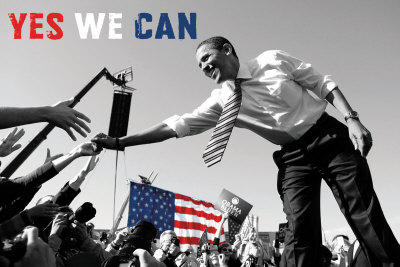The Real World

January 2009 The Psychologist, 22 (1), 9.
On the night Barack Obama was elected, it was perhaps the pictures of his wife and children greeting the ecstatic crowd in Chicago that were the most moving. Forty years after black people were excluded from lunch counters, schools and swimming pools in the United States, a black family stood poised to enter the White House.
But still, we are entitled to ask – indeed we cannot help but ask – what will happen next. And, as soon as he began to speak, the President-Elect signalled an ambivalence that lay at the heart of his appeal: the aspirational slogan ‘Yes we can’ (which presumably, in the US, does not invoke Bob the Builder). The unifying and mobilising power of such devices often lies in the fact that they mean different things to different people, and indeed Obama’s phrase has readings that lead in opposed political – and psychological – directions.
One reading is an assertion of individual mobility that lies at the heart of the ‘American Dream’. In the US, it says, anyone can achieve anything if they try hard enough. To quote Obama’s opening sentence: ‘If there is anyone out there who still doubts that America is a place where all things are possible, who still wonders if the dream of our founders is alive in our time, who still questions the power of our democracy; tonight is your answer’.
Attractive as it sounds, the flip side of such an individualist argument is that if anyone fails it is their own fault. They haven’t tried enough. At its extreme, this position was expressed by John Bolton, Bush’s erstwhile ambassador to the UN, in a telling exchange with Simon Schama during the BBC’s coverage. If America votes Obama, Bolton warned, I hope you will never again say America is racist.
But the real danger of such an argument is not how it is used by whites but how it impacts on black people. The illusion that racism is dead, that the barriers to progress are removed, that all corners of society are permeable is, as social identity research has shown, profoundly demobilising for subordinated groups in society. Indeed it tells them to ignore the group and set off in an individual quest for personal advancement.
But of course Obama is not John Bolton, and the American Dream is only one side of his appeal. The other side is a reading of ‘Yes we can’ which is clear later in his speech where he echoes Martin Luther King’s famous ‘I have a dream’ address: ‘The road ahead will be long. Our climb will be steep. We may not get there in one year or even one term, but America – I have never been more hopeful than I am tonight that we will get there. I promise you – we as a people will get there.’
This is a rhetoric which carries with it the three key ingredients which facilitate collective mobilisation. First, it emphasises the lack of permeability and the existience of barriers which require collective action (rather than emphasising permeability which allows for individual mobility). Second, it stresses the legitimacy of the cause (and hence the illegitimacy of existng inequalities). There is a sense of collective entitlement which is central to the original Spanish version of Obama's slogan 'Si se Puede' (used by Cesar Chavez in the 1960s as a slogan for organising farm workers in California): a combination of 'Yes we can' and 'Yes we may'. Third, there is a sense of possibility, of strength, and the prospect of building a new world. In the language of social identity theory, this is a rhetoric of cognitive alternatives.
All together, the contrast is between a reading of 'Yes we can' that separates Americans into equal individuals living in a world that is fair in the here and now, and one that unites people in a collective force dedicated to creating a fair world in the future. Two visions. Two psychologies. Which one will come to predominate?
The Real World
A Migrant is not a migrant by any other name
October 2015
It's a man's (virtual) world
June 2014
Putin: The Naked Truth
April 2014
Genius and creativity (re)explained
October 2013
In praise of asylums
September 2013